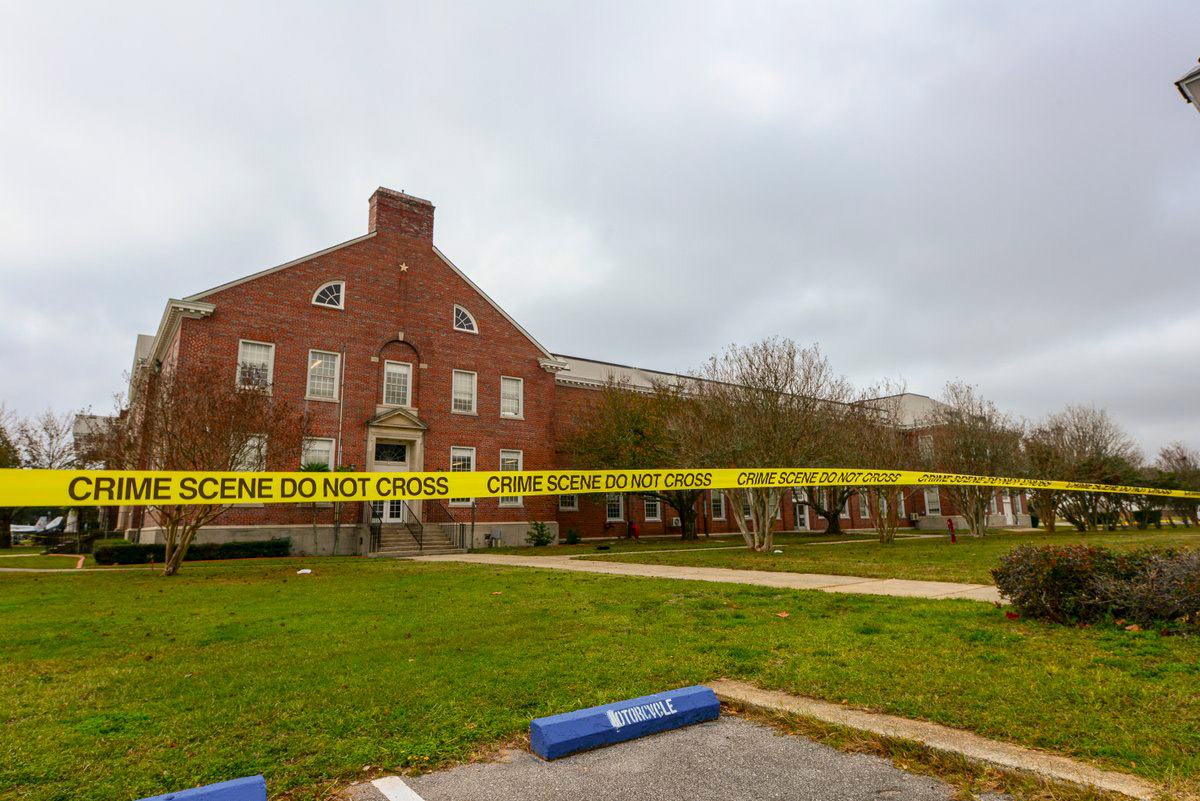
As the U.S. Navy reels in the wake of a horrific shooting at an iconic naval base in Pensacola, Florida – the heart of naval aviation – many voices are asking why we do have foreign militaries training here in the United States. In particular, this shooting, conducted by a Saudi Arabian Air Force 2nd lieutenant, has echoes of 9/11 when 15 of the 19 attackers were Saudi Arabian nationals. Why was this Saudi air force lieutenant here? And what should we be doing to improve the process of vetting and monitoring these foreign students in the heart of our national security structure?
There are a series of vital reasons why we have well over 5,000 officers and enlisted troops in the U.S. from over 150 countries on any given day, which range from facilitating foreign military sales to cultural engagement to building coalitions.
When I was a young junior officer in the Navy in the mid-1970s, I was sent to a missile school in Great Lakes, Michigan. Alongside my class of about 15 officers and enlisted was a similarly sized class of Iranian naval students. At the time, we were allies with the Iranians under the Shah of Iran and they had purchased four advanced guided missile destroyers and the Iranians were there to learn how to operate them. That class of Iranians were anything but religious in character – they were often seen closing the bar in the officer’s club and always ran up the biggest tabs there.
Over the course of several months, I got to know several of them very well and learned a great deal from them about Iran itself. As my long career unspooled, of course, Iran went from a U.S. ally to an implacable foe. But what I learned from those students about Iran – its imperial dreams, its sense of historical entitlement throughout the larger Middle East, their version of Shi’a Islam, its economy, and how its military operated – has been hugely important for me. This kind of cultural integration pays big dividends for the US military over time – when we learn about other militaries in the relatively relaxed framework of training, we often learn a great deal.
Another key reason is quite simple: to encourage other nations to buy U.S. technology, from high performance jets to air defense missiles to warships and tanks. While the US operates with a strict set of oversight rules guiding what technology can be transferred and to whom, most nations want US defense technology and many of the sales come with appropriate training. This is valuable not only for the obvious economic benefits, but also for interoperability between allies, partners and friends. When a majority of NATO members, for example, purchase communication systems from us, it makes alliance command and control far easier. Likewise if many of our partners operate U.S. aircraft like the F-16 or the new Joint Strike Fighter, the F-35, our common air defense is vastly better.
Finally, the personal connections that ensure are occasionally profound. To give two examples, when I was a mid-grade officer I attended the premier military institution, the U.S. National War College at Fort McNair. Through that connection, I met mid-grade officers in the Polish and Israeli militaries. One was later the Chief of the Polish defense forces, General Franciszek Gagor. When I was Supreme Allied Commander of NATO, that connection was pure gold. The other was a tall Israeli paratrooper who looked a lot like Clint Eastwood. His name was Benny Gantz, and he went on to be the head of the Israeli armed forces and now is possibly the next prime minister of Israel. He remains a close friend today. Even in this world of high-speed communications, social networks, and teleconferences, personal contact still trumps everything.
One question in the aftermath of the Pensacola shooting is obvious: vetting. There will be a thorough investigation, and the key finding will almost certainly be an analysis of where the system failed to vet the shooter, as well as those who had any knowledge of his intent before the incident. We’ll have to wait for those results, but knowing the military well, I believe there will be an even tighter set of standards applied – from deeper social network investigation, to increased records analysis in the home country, to increased law enforcement cooperation on both the civilian and military side.
It is worth noting the instinctive and instantaneous acceptance of the Saudi king’s reaction to the shooting by President Trump. Given his extreme skepticism about pronouncements from other allies (including most recently at the NATO summit), it is odd that Trump is so quick to support the Saudis, especially given the circumstances here. The President should take a more measured approach in assessing the incident until FBI and other investigations into possible terrorism connections run their course.
Will things always go smoothly with foreign military students? Of course not and Pensacola is only one example – we have seen drunk driving incidents, fatal collisions, desertions, sexual encounters, and many other occasional failures. But the overwhelming number of encounters produce real cultural learning, promote technological integration with allies and occasionally create a personal relationship that pays dividends over long decades of service – a pretty good return on investment.
More Must-Reads From TIME
- The 100 Most Influential People of 2024
- Coco Gauff Is Playing for Herself Now
- Scenes From Pro-Palestinian Encampments Across U.S. Universities
- 6 Compliments That Land Every Time
- If You're Dating Right Now , You're Brave: Column
- The AI That Could Heal a Divided Internet
- Fallout Is a Brilliant Model for the Future of Video Game Adaptations
- Want Weekly Recs on What to Watch, Read, and More? Sign Up for Worth Your Time
Contact us at letters@time.com